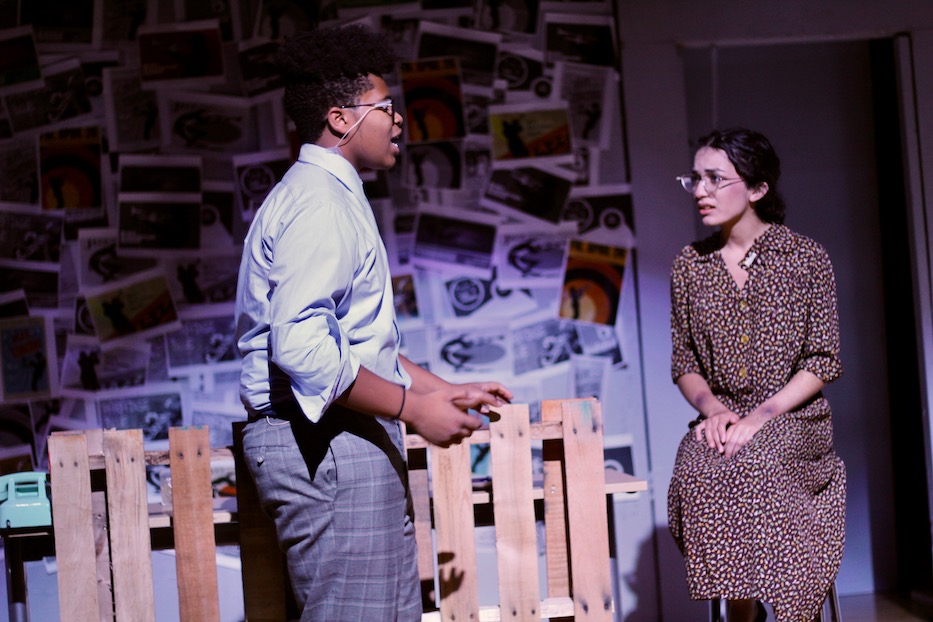
Education & Youth | Arts & Culture | Theater | Arts & Anti-racism | New Haven Academy
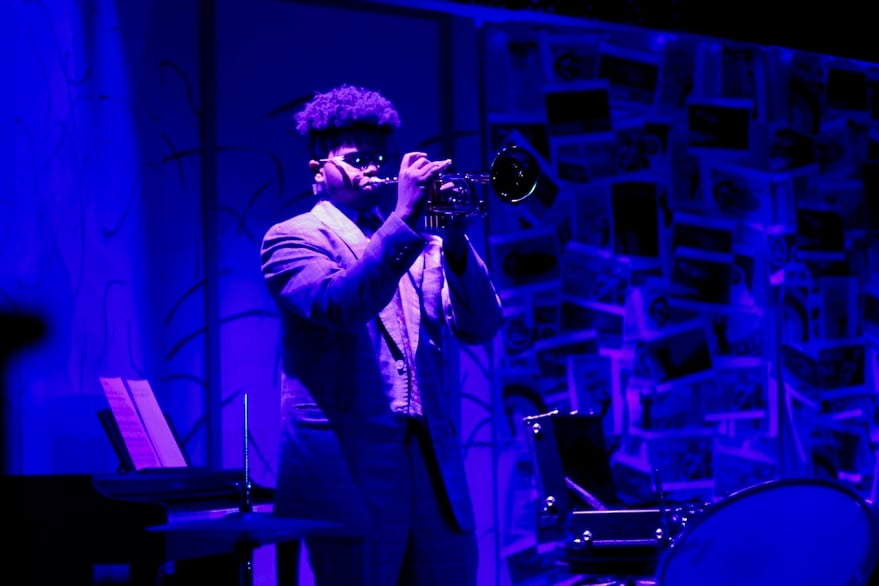
Christopher Samuels as Blue. Lucy Gellman Photos.
Night in Detroit's Black Bottom neighborhood, so late that the first whispers of dawn are just starting to creep in. By the piano, Blue stands alone, his trumpet steady and sacred in both hands. He tilts his head back, and the sound wails over the empty tables and chairs, cutting through the stillness. It's a cry full of torture and melancholy—not for the present exactly, or the past either, but perhaps for what is to come.
That sound cuts to the heart of Dominique Morriseau's Paradise Blue, running at New Haven Academy (NHA) this Thursday through Saturday at the school's 444 Orange St. campus. The work of the NHA's still-nascent drama club, the play tells the story of Detroit's Black Bottom neighborhood during a tumultuous time of transition for the city, in which thousands of Black families were displaced during mid century urban renewal. It is directed by Ty Scurry, who is in his second year of teaching tech theater at the school.
Performances run Thursday and Friday at 7:05 p.m. and Saturday at 11:35 a.m. and 4:35 p.m. Tickets and more information are available here.
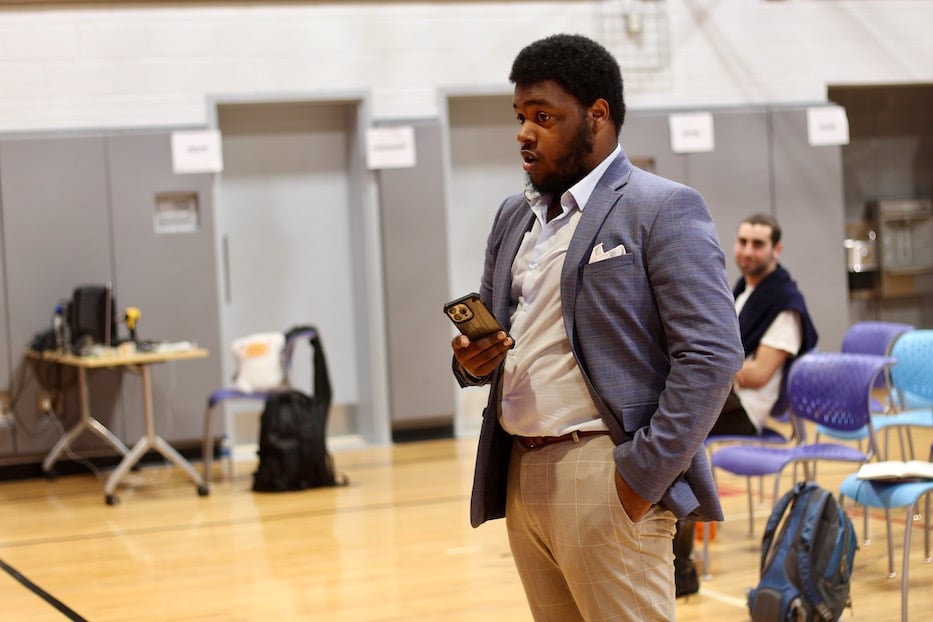
Scurry at final dress Wednesday.
"The historical context of the show really made me think, 'Wow, I really want to do this show with high schoolers,'" said Scurry, who fell in love with the show on a field trip to Long Wharf Theatre in 2018, when he was still a student at Wilbur Cross High School. "When you pick a show like Paradise Blue, it forces you to teach while you're embracing them into the world of theater. You have to teach them. It becomes this ongoing cycle where everyone is educating themselves."
Written as the second play (although it is the first chronologically) in Morisseau's Detroit Trilogy, Paradise Blue tells the story of a neighborhood on the cusp of urban renewal, and the very human stories caught in its discriminatory crosshairs. The year is 1949, and Blue (Christoper Samuels) is doing his best to keep the legacy of his father's jazz club alive, with the help of his partner Pumpkin (Mikaila "Sora" Mae Matta) and sometimes-grudging musicians Cornelius (Azaad Mamoon) and P-Sam (Jeremiah McCullough). Upstairs, a mysterious new visitor (Michelle Cochran as Silver) has rolled into town, bringing a sharp-tongued taste of the bayou with her.
Haunted by his parents' ghosts (Lily Gonzalez as his mother and Jesse Ramirez as his father), Blue debates whether to sell the club, and head for Chicago in search of a more prosperous life and music scene. Around him, the city is changing: incoming Mayor Albert Cobo, a real-life figure who campaigned against public housing and for so-called "slum clearance," has pledged to beautify Detroit—although it's not clear for whom and at what costs. The beginning of white flight, although nobody knows it yet, is less than a decade away. Paradise Valley, once a self-sustaining Black business district, teeters precariously on the edge of a loss that is too profound for characters to know.
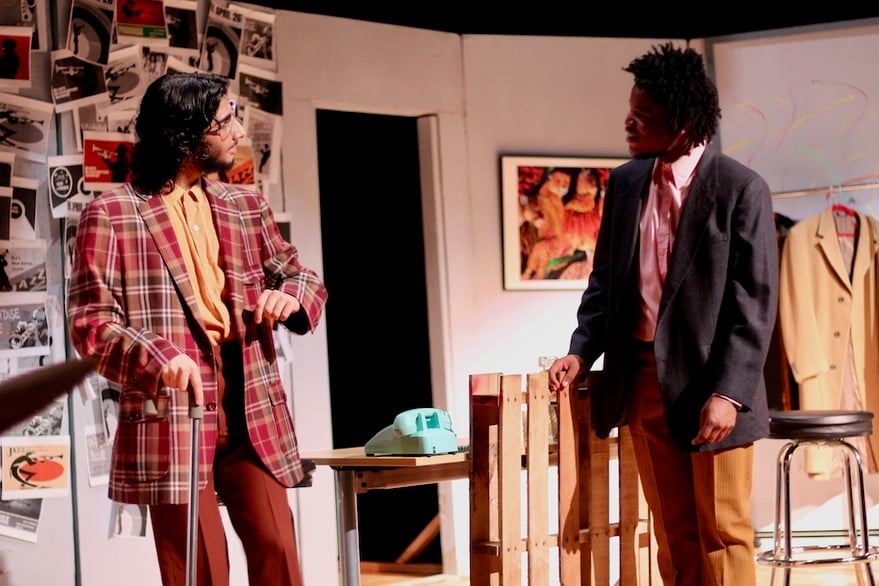
Azaad Mamoon as Cornelius and Jeremiah McCullough as Percussion Sam (P-Sam).
Blue is struggling to keep the doors open, despite pinching pennies on everything from 75-cent entry to packets of hot sauce. And all the while, there's a sadness that hangs over the place, as if the club's inhabitants—and maybe its ghosts, too—know what's coming, but believe they can will it away if they just play hard enough. If music is a thread throughout, so too is food and conversation, weaving a story of migration and displacement that continues today.
"We've kind of created this world, almost," Scurry said. "The tech theater class, and my student actors, and tech crew has kind of really gelled and meshed and created their own version of how they perceived this production to look. This is really and truly their show."
What is amazing, as the lights come up on NHA's stage, is how wholly and deftly students have immersed themselves in this world, taking a leap into social, sexual, and economic conflicts that feel well beyond their years. From the beginning, Samuels brings a deep and smoldering complexity to Blue, who can be brooding one moment, and explode into a red-hot rage the next.
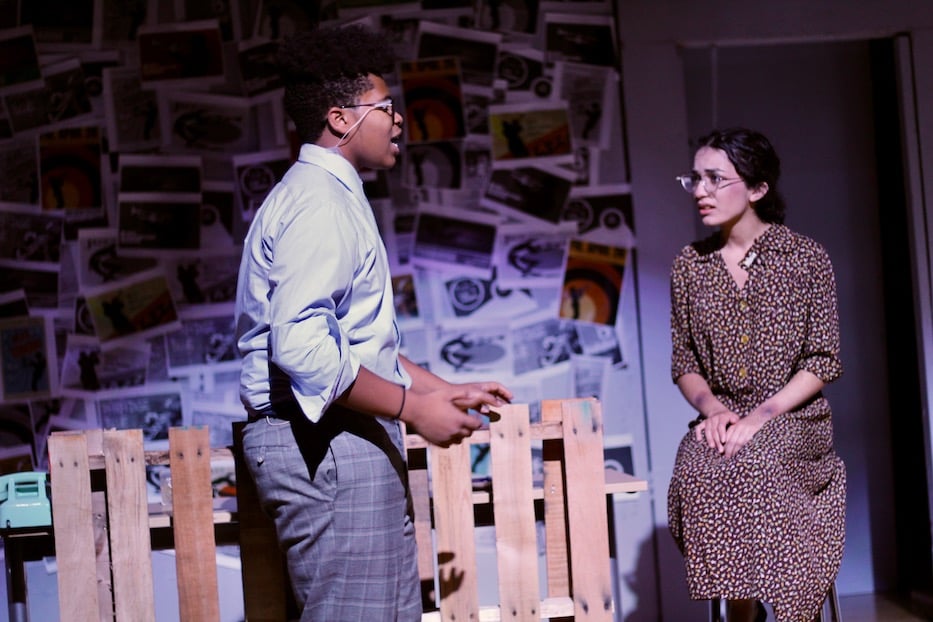
Christopher Samuels as Blue and Mikaila "Sora" Matta as Pumpkin.
When he lifts his trumpet to the sky, it's a prayer, but also a strangled cry for help, as if the instrument can feel what it's like to be miles underwater with no path to the surface. A sophomore at the school, Samuels seems much older onstage, as he grapples with the future while trying to hold tight to the past, and watching it slip through his fingers.
Alongside him—and sometimes, trying their best to predict his foul moods—no one in this young cast misses the mark. To P-Sam, McCullough brings a steely resolve that becomes more interesting as Morisseau peels back the layers, and the audience finds a portrait of a man very much on edge. As Cornelius, Mamoon fully embraces the role of peacemaker, mellow as he tries to hear everyone out and prevent conflict between Blue and P-Sam ( or in his words, "I ain't defending the devil! I'm trying to keep everything smooth!"). As he walks in with a cane and lilting, warm Southern accent that gives him a backstory, he steps fully into the world of the show, careful to keep everything in balance as he moderates publicly, and worries to himself about the future of the club.
In his acting debut, Mamoon is also particularly gifted at what goes unsaid: he conveys longing, frustration, surprise and delight in his face and body throughout the show, particularly after Silver arrives and begins to stir the pot that is the Paradise Club. And no wonder that she does: Cochran is a bit of a dramatic wunderkind, tapping into a kind of wisdom, wit and sensuality that feels decades away from freshman year of high school. From the moment she arrives to her final scene, she nails every line, turning the world just slightly more off-kilter every time she does.
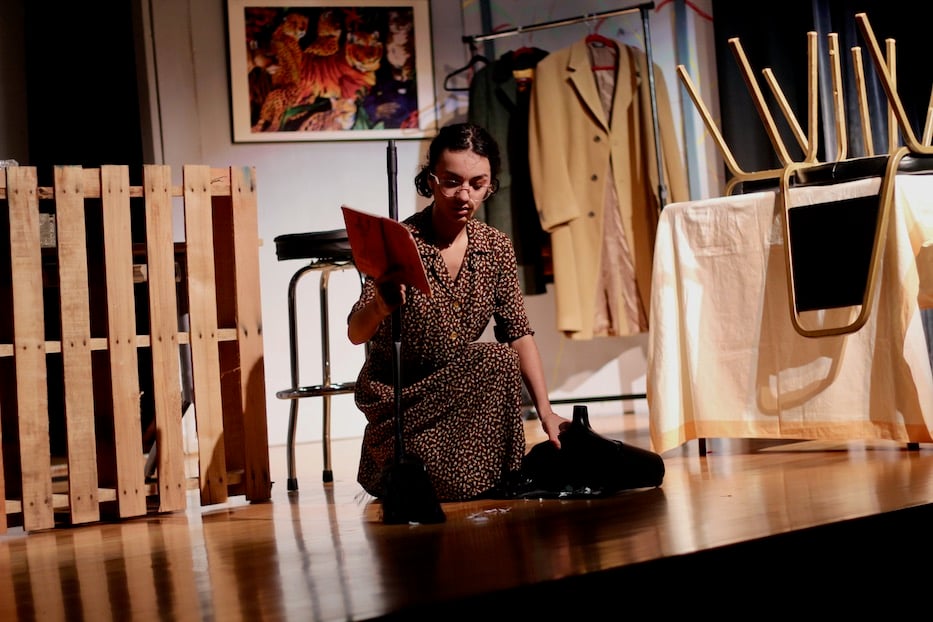
Mikaila "Sora" Matta as Pumpkin.
As Pumpkin, the soft-eyed sweetheart who memorizes poetry as she's sweeping the floors and changing the bed linens, Matta is often the tender and beating heart of the show. In the role—a stark contrast to their time in Little Shop of Horrors earlier this year—they have summoned a kind of shy sadness and curiosity that feels infinite, that much more interesting to watch as it melts away and the most essential version of Pumpkin comes through. That the character can't fully understand the poetry she is memorizing—until, of course, her eyes are opened to the world and she can—feels right, and it's a gradual transformation that the actor savors even as they nail each line and scene transition.
Onstage, students have mined the script not only for its depth but also for its humor and feeling, which comes out in quick quips and sustained interactions alike. The result is a profound human-ness, despite the fact that Paradise Blue often sits in the hands of a much older cast. "These folks here like family!" Pumpkin cries at the idea of slum clearance, and a listener can feel the hurt and rawness in the words. So too when Cornelius declares that "these folks ain't done nothing but living where they can afford," and decades of American history come collapsing in on each other.
Those interactions may be most masterful when two characters are left alone onstage, giving students the time and space to listen to and play directly off of each other. At one point, for instance, Pumpkin and Corn are together in the club's main music room, one reading poetry as the other samples cornbread before the dinner crowd has arrived. It's sweet, but never saccharine: the two orbit each other like comfortable planets, their conversation as much about what is said (the poetry of Georgia Douglas Johnson, Pumpkin's cooking prowess, Corn's musicianship) as what isn't (the club's future, Pumpkin's inability to sing, Blue not deserving the woman he has).
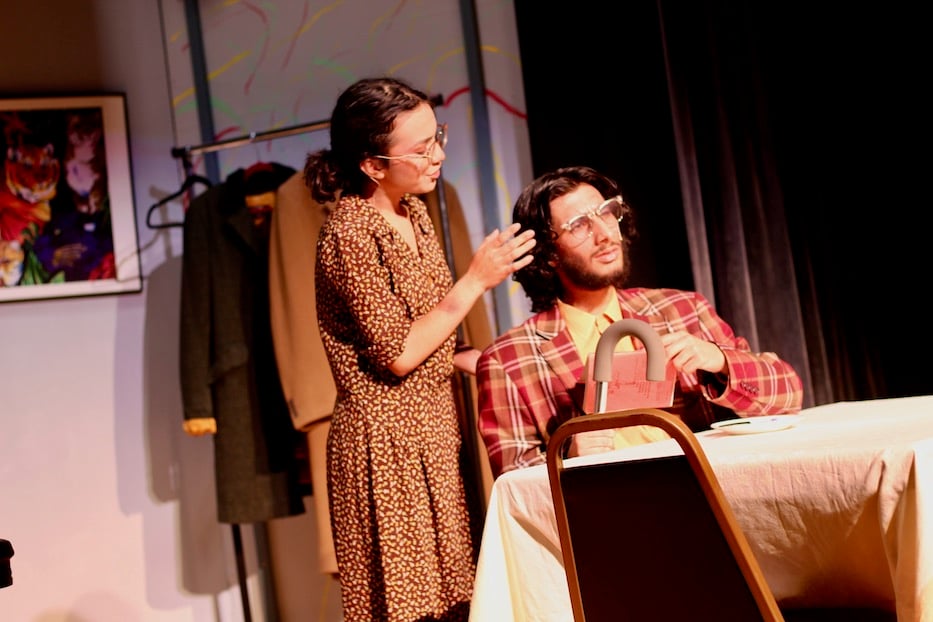
At another, Blue promises Pumpkin a trip down Woodward Avenue to J.L. Hudson's Department Store, and the interaction pulses with uncertainty and longingas the two pull on their coats and head out the door.Their pauses are heavy: Blue knows that he can’t really afford to buy his girl a new outfit, and that he won’t be particularly welcome in the store, either. Pumpkin’s in on the shame and the illusion, but goes along with it because it’s the path of least resistance.
These moments are magic: they bring the audience into Morisseau's Detroit, but also show them how often these young people may be the wisest and sharpest voices in the room.
Some of the casting decisions, meanwhile, open the play to new questions around the creation of race and racism as a social construct meant to divide both people and resources. In Morisseau's original work (and true to the neighborhood’s history), all of the characters are Black. That's inherently part of the play's power: the audience hears about the segregationist and gentrifying forces lurking beyond the club's front door, but never sees them. The story is a story of human lives, and the stakes that are very real for each of them.
But in NHA's production, Scurry has flipped some of that on its head. After auditions, he made the call to cast Silver, who is on the run from killing her husband, as a white character ("I battled with it for two days," he said in an interview before a final dress rehearsal on Wednesday night), and Corn, Pumpkin, and the ghosts of Blue's parents as characters who are racially ambiguous. As the show plays in a city that is still grappling with the scars of redlining and urban renewal—and also fighting gentrification—it strikes a surprising and unexpected chord.
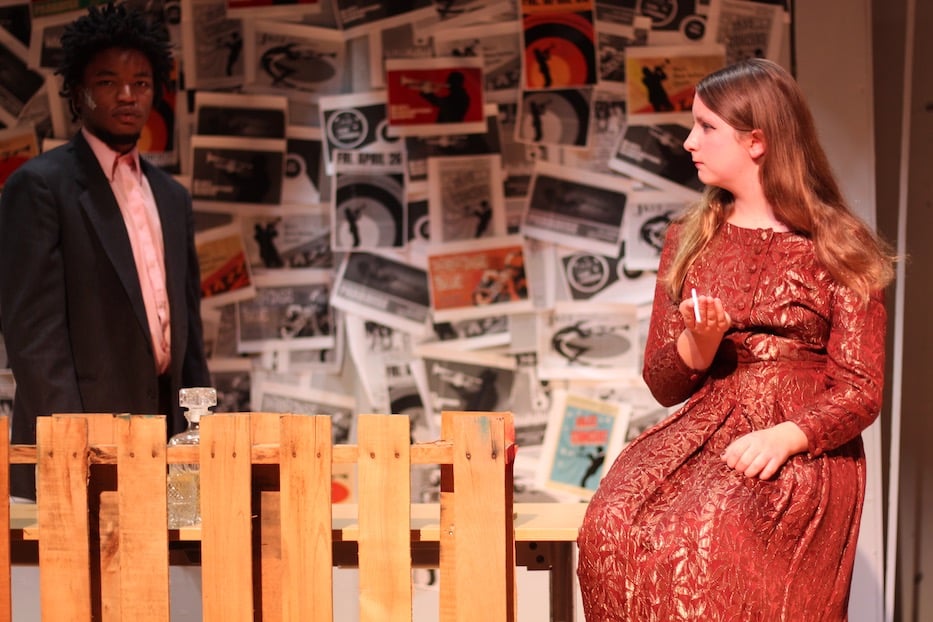
Jeremiah McCullough as P-Sam and Michelle Cochran as Silver.
It helps that cast and crew members alike have a firm grounding in the period's history, thanks to both Scurry and New Haven Academy's "Facing History" curriculum. While Paradise Blue is specific to Detroit, it is also a New Haven story. Not unlike Dixwell Avenue, Black Bottom was once a booming Black business district, home to everything from Black physicians to pharmacists, grocers, and produce and dairy distributors. It was known for its vibrant jazz clubs, which in the first half of the 20th century saw performers like Duke Ellington, Charlie Parker, Billie Holiday, and Charles Mingus.
And then, it was gone, and washed largely from the city's historical record. After the passage of the American Housing Act of 1949, the City of Detroit seized and razed the area, claiming “slum clearance” and using the land to make room for the Chrysler Freeway (I-75), sprawling Detroit Medical Center, and now-historic Lafayette Park neighborhood, where apartments designed by Mies van der Rohe sell for a small fortune. Almost no traces of the area's history remain.
When he revisited the work as a theater teacher, Scurry found that it resonated deeply with him. It wasn't Black Bottom that sprang immediately to his mind: it was Dixwell, where he grew up visiting his grandparents after moving to New Haven as a kid. Scurry, who now lives on Henry and Orchard Streets, spent years around the Elks Lodge and old Stetson Branch Library. During rehearsals, he brought students to the old Monterey Club. He's seen how the neighborhood is changing: a wire fence went up around ConnCORP’s planned development just weeks before rehearsals started.
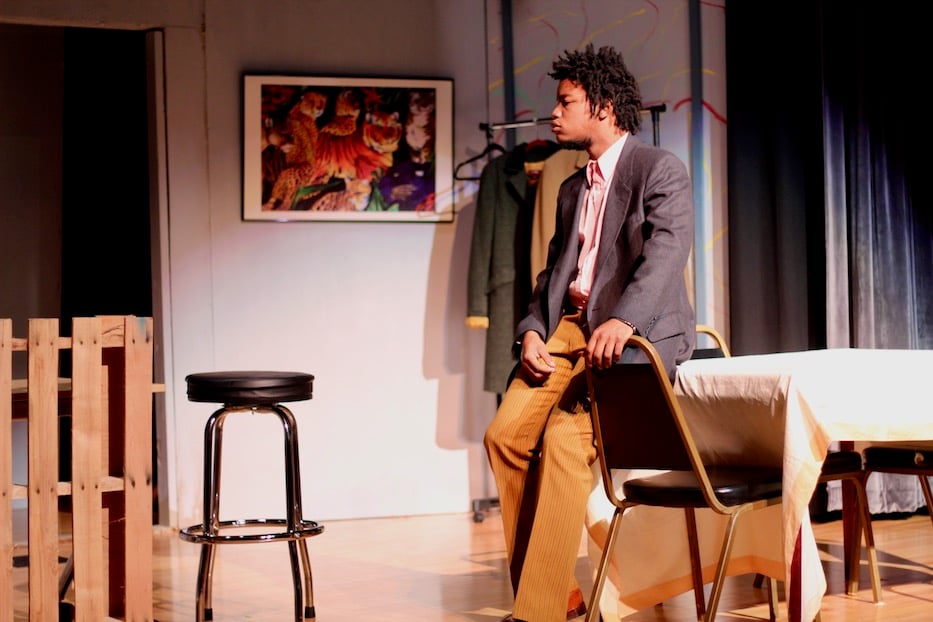
"It dealt with colored people, and people on the verge of change not understanding how drastic the change was going to be," he said. "We're on the cusp of a quite literal big change in New Haven. We have ConnCAT Place coming, and that's going to drastically change the way Dixwell Avenue looks. I'm always happy to see new things coming, but I always wonder at what expense do those new things come?"
It turns out students are thinking about that too, as they navigate both the show and a city that is transforming before their eyes. Mamoon, an aspiring high school history teacher who is a senior and first-time actor in the show, said he finds it interesting to bring the play to life for both its historical context and its current resonances. He added that he’s grateful for the drama family it’s provided him.
"The characters are all victims of gentrification," he said. During his classes and in rehearsals, he's talked about how the show relates to New Haven history. "You can't not think about it, unless you haven't read the script."
Much like the characters in the show, he and fellow actors have also found and held onto intentional community. Mamoon joked that he’s used to being such a mediator that some of his friends and fellow cast members call him Corn, instead of Azaad.
Cochran, who grew up in Ypsilanti, Mich. and moved to Hamden three years ago, also applauded the community that she's been able to build with fellow students through the drama club, which will go into auditions for the winter play as soon as Paradise Blue is over.
"You're all here after school [for] long hours, and you're all coming together to create something that the community is going to see," she said. "The bonding that goes along with that is nice. You don't get that in other places."
"Having a big community to be able to do things with is really important, especially with something like the arts," chimed in Tomitsela Engel-Halfkenny, who is the show's assistant production stage manager. "You can be really vulnerable. Especially doing in-person, live theater, it's a really vulnerable acy And to have that group of people that are able to surround you, that are able to help you ... it's not something you can get in any other art form."
During the show, those words come to life over and over again, as characters lay the story out onstage. At a final dress rehearsal for the show on Wednesday, Scurry gathered cast and crew members around him, students bowing their heads as if they were in prayer. They were ready, he told them. They had to be.
"Breathe in every negative thing that happened today," he said. The room took a collective breath. "Hold it. Hold it. Hold in the annoyance. The frustration. The exhaustion. Now let it go."

